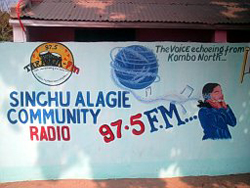New York, August 12, 2011–Gambian state security agency forced radio station Taranga FM to drop its popular news and current affairs programs for the second time this year, local journalists said. The National Intelligence Agency (NIA) threatened to close the community station southwest of the capital, Banjul, if the broadcaster did not drop its daily news programs in Wolof and Mandinka.
Gambia has an adult literacy rate below 50 percent, according to UNESCO statistics, and the programs–on which government and private newspapers were read in local languages–are essential sources of information for a significant portion of the population. The censorship threat came barely a week after Gambian Foreign Affairs Minister Momodou Tangara declared at a public media forum sponsored by the Commonwealth, of which Gambia is a member state, that the government was “committed” to press reform, according to news reports.
“We condemn the illegal act of political censorship to silence Taranga FM ahead of the November presidential elections,” said CPJ Africa Advocacy Coordinator Mohamed Keita. “We call on President Yahya Jammeh to make the rule of law a reality in Gambia. Taranga FM should be allowed to carry out its duties of informing the public about current affairs without government interference.”
NIA forced Taranga FM off the air for 32 days in January and February over the same news programs, CPJ research found. In a letter to the station in February, H.M Tambedou, Secretary General of the Office of Gambian President Yahya Jammeh, “authorized” Taranga FM to return to the air with the condition that it not review “opposition” newspapers–independent publications such as Foroyaa, Daily News, and The Point–according to Ghana-based press freedom group Media Foundation of West Africa.
The NIA communicated the ultimatum to Taranga FM Managing Director Ismaila Ceesay on Wednesday after summoning him to its headquarters, according to local journalists. Taranga FM’s news programs aired three times daily from Monday through Saturday, and the station had been censoring itself after returning to the air in February, local reports said.
Years of brutal repression of critical reporting by Jammeh’s government have turned the Gambia into one of the most repressive countries for journalists in Africa, according to CPJ research. Among other abuses, the Jammeh administration has summarily banned three independent radio stations (Citizen FM, Radio 1 FM, and a local bureau of Senegalese station Sud FM) and The Independent newspaper, chilling the press into self-censorship and forcing several journalists into exile. The NIA has not only been involved in arbitrary closures of media outlets, but it has also been involved in extrajudicial detentions and torture of journalists, CPJ research showed.
